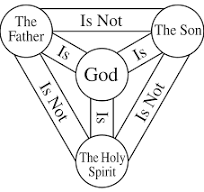I'll try it another way. The siolistic view of
@BreadOfLife is this:
1. Mary is the mother of Jesus;
2. Jesus is God; therefore,
3. Mary is the mother of God
But to see why it just doesn't work, please bear with me, because we must delve into Trinitarian logic a bit (hope we don't get banned!).
Trinitarians hold that
1. There is only one God.
2. The Father is God.
3. The Son is God.
4. The Father is not the Son.
The difficulty in understanding the Trinity has always been that these four propositions are, as a group, logically inconsistent when analyzed from the standpoint of the three basic rules of logical equivalence: self-identity (everything is identical to itself, i.e., x = x); symmetry (if two things are equivalent, they are equivalent in any order, i.e., if x = y, then y = x); and transitivity (if one thing is the same as another and that other is the same as a third, then the first is the same as the third, i.e., if x = y and y = z then x = z). T
he orthodox doctrine of the Trinity fares ill in this analysis.
To make them logically consistent, we would need to sacrifice one of the four tenets. And that has been the approach of many who were branded as heretics throughout the history of the Church. Thus, Arius sacrificed the third one:
1. There is only one God.
2. The Father is God.
4. The Father is not the Son.
3′. Therefore
the Son is not God.
and Sabellius sacrificed the fourth one:
1. There is only one God.
2. The Father is God.
3. The Son is God.
4′. Therefore the Father
is the Son.
Both Arius’ argument and Sabellius’ argument are logically consistent because, unlike the orthodox doctrine of the Trinity, they satisfy all three of the aforementioned principles of logical consistency. Arius and Sabellius, although approaching the inconsistency from different perspectives, each preferred rationality to irrationality―even if it meant preferring heresy to orthodoxy.
Now, we Trinitarians have two choices. We can simply throw up our hands and declare that God does not have to play by the rules of logical consistency, thereby forever assigning the Trinity to the status of unfathomable mystery --
@BreadOfLife is in this camp. Or, we can allow for identity and equivalence to be relative to their contexts. Thus, “Robert is good” can be consistent with “Robert is not good” as long as a different sense of “good” holds for each proposition (e.g., he is a good theologian; he is not a good golfer.)
To say that “The Father is not the Son” is likewise context-dependent and predicate-specific. We can maintain without contradiction both that “The Father is not the same
person as the Son” and “The Father is the same
God as the Son” only by separating out personhood from Godhood.
How to tease them apart is the ultimate challenge of orthodox Trinitarian theology.
But separating personhood and Godhood is exactly the task confronting whoever wants to proclaim Mary as Mother of God (as opposed to just mother of Jesus).
This is what I was getting at . . . motherhood is context dependent.



